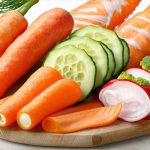Nausea can be debilitating, turning even simple tasks into monumental challenges. Often accompanied by vomiting or the strong urge to vomit, nausea isn’t just unpleasant; it can lead to dehydration, making recovery much harder. While medications can sometimes help, focusing on dietary adjustments – specifically incorporating hydrating foods – is a gentle yet powerful way to soothe your stomach and replenish lost fluids. This approach supports your body’s natural healing processes without the potential side effects of medication. It’s about finding comfort and nourishment when you feel at your worst.
Recovering from nausea isn’t always about stopping the feeling immediately; it’s often more crucial to prevent dehydration and provide gentle, easily digestible sustenance. Many people instinctively avoid food during bouts of nausea, but prolonged avoidance can worsen weakness and prolong recovery. The key is choosing foods that are easy on the digestive system and actively contribute to rehydration.
Understanding Hydration & Nausea
Nausea frequently leads to fluid loss through vomiting or diarrhea, or even just reduced intake because eating feels impossible. Dehydration exacerbates nausea symptoms, creating a vicious cycle. Plain water can be difficult to keep down when you’re feeling nauseous, which is where hydrating foods become invaluable. They offer fluids alongside beneficial nutrients and are often more palatable than water alone during these times. Think beyond just drinking – think about eating your hydration!
The stomach gets very sensitive when experiencing nausea, so the goal isn’t to fill it up with lots of food, but rather provide small, consistent doses of easy-to-digest options. Foods that are bland, low in fat, and easily digestible are best. Avoid spicy, greasy, or heavily scented foods as these can often worsen symptoms. Remember, everyone reacts differently; what works for one person may not work for another, so listen to your body’s cues.
Hydration isn’t just about the amount of fluid; it also involves electrolytes, minerals like sodium, potassium and magnesium that are lost through vomiting or diarrhea. Many hydrating foods naturally contain these essential electrolytes, further aiding in recovery. Focusing on replenishing these alongside fluids is vital for restoring balance.
Top Hydrating Foods to Soothe Nausea
There’s a surprising range of delicious and restorative foods that can help you stay hydrated while navigating nausea. Fruits like watermelon, strawberries, and grapes are fantastic choices – they’re naturally sweet, packed with electrolytes, and have high water content. Vegetables such as cucumbers, celery and lettuce also contribute significantly to hydration due to their high water percentage.
Beyond fruits and vegetables, certain soups and broths can be incredibly soothing. Clear broth (chicken or vegetable) provides fluids and essential sodium, while ginger-infused teas or even small amounts of ginger in soup can help calm the stomach. Jellies and popsicles are also excellent options for gentle hydration, especially if you struggle to keep liquids down. The cool temperature and simple sugars can be comforting and easier to tolerate.
Gentle & Digestible Options
For many experiencing nausea, complex foods are simply off-limits. This is where BRAT diet staples – bananas, rice, applesauce, and toast – come into play. These foods are bland, low in fiber, and easy for the stomach to process. Bananas provide potassium, which is often lost during vomiting, while white rice is gentle on the digestive system. Applesauce offers easily digestible carbohydrates and fluids. Plain toast can help absorb excess stomach acid.
However, don’t rely solely on the BRAT diet long-term, as it lacks essential nutrients. It’s a good starting point for reintroducing food but should be gradually supplemented with other hydrating options as tolerated. Small, frequent meals are much better than large ones when recovering from nausea. This prevents overwhelming your stomach and reduces the likelihood of triggering further discomfort.
Electrolyte-Rich Choices
Electrolytes are crucial for restoring balance after fluid loss. Coconut water is a natural source of electrolytes, offering potassium, sodium, and magnesium in an easily digestible form. Sports drinks can also provide electrolytes, but be mindful of their sugar content – opt for low-sugar or diluted versions. Pedialyte, originally formulated for children, is another good option as it’s specifically designed to rehydrate effectively.
Beyond dedicated electrolyte solutions, many hydrating foods naturally contain these essential minerals. Watermelon boasts potassium and magnesium, while celery provides sodium. Incorporating a variety of these options ensures you’re replenishing lost electrolytes and supporting your body’s recovery process.
Beyond Food: Supportive Practices
Hydrating foods are just one piece of the puzzle. Resting adequately is vital for allowing your body to recover. Avoid strong smells and triggers that exacerbate your nausea, such as certain perfumes or cooking odors. Fresh air can also be helpful, so opening a window or stepping outside briefly may provide relief. Gentle breathing exercises can calm your nervous system and reduce feelings of anxiety associated with nausea.
Ultimately, listening to your body is the most important thing you can do. Don’t force yourself to eat if you’re not feeling up to it; instead, focus on small sips of fluids and gradually reintroduce foods as tolerated. Recovery takes time, so be patient with yourself and prioritize gentle nourishment.
As nausea subsides, slowly expand your diet to include more complex carbohydrates, lean proteins, and healthy fats. This helps restore your strength and energy levels. Remember that staying hydrated is an ongoing process, even after the immediate symptoms have passed, supporting overall well-being and preventing future episodes of nausea.


















